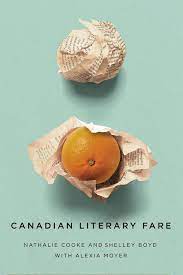Search Results: Returned 10 Results, Displaying Titles 1 - 10
-
-
2008., Adult, Wilfrid Laurier University Press ; Gazelle [distributor] Call No: BLK 811.54 C598b Availability:1 of 1 At Your Library Summary Note: Blues singer, preacher, cultural critic, exile, Africadian, high modernist, spoken word artist, Canadian poet - these are but some of the voices of George Elliott Clarke. In a selection of Clarke's best work from his early poetry to his most recent, 'Blues & Bliss' offers readers a cross-section of those voices.
-
-
2023., McGill University Press Call No: NEW QWF 810.9 C772c Availability:1 of 1 At Your Library Summary Note: When literary writers place food in front of their characters--who after all do not need sustenance--they are asking readers to be alert to the meaning and implication of food choices. As readers begin to listen closely to these cues, they become attuned to increasingly layered stories about why it matters what foods are selected, prepared, served, shared, and with whom, where, and when. In Canadian Literary Fare Nathalie Cooke and Shelley Boyd explore food voices in a wide range of Canadian fiction, drama, and poetry, drawing from their formational blog series with Alexia Moyer. Thirteen short vignettes delve into metaphorical taste sensations, telling of how single ingredients such as garlic or ginger, or food items such as butter tarts or bannock, can pack a hefty symbolic punch in literary contexts.
-
-
[2001], Gaspereau Press Call No: BLK 811.54 C598e Edition: [Trade ed., New ed.]. Availability:1 of 1 At Your Library
-
-
-- George and Rue.c2005., Adult, HarperCollinsPublishersLtd. Call No: BLK Fic Cla Availability:1 of 1 At Your Library
-
-
2015., Adult, Viking Call No: 616.85 E46g Availability:1 of 1 At Your Library Summary Note: "In 1999, Clark Elliott suffered a concussion when his car was rear-ended. Overnight his life changed from that of a rising professor with a research career in artificial intelligence to a humbled man struggling to get through a single day. At times he couldn't walk across a room, or even name his five children. Doctors told him he would never fully recover. As a result of one final effort to recover, he crossed paths with two brilliant Chicago-area research-clinicians--one an optometrist emphasizing neurodevelopmental techniques, the other a cognitive psychologist--working on the leading edge of brain plasticity. Within weeks the ghost of who he had been started to re-emerge. Elliott kept detailed notes throughout his experience, from the moment of impact to the final stages of his recovery. His book gives hope to the millions who suffer from head injuries each year, and provides a unique and informative window into the world's most complex computational device: the human brain"--Provided by publisher.
-
-
2021., Adult, Alfred A. Knopf Canada Call No: NEW BLK Bio C598w Availability:1 of 1 At Your Library Summary Note: A vibrant, revealing memoir about the cultural and familial pressures that shaped George Elliott Clarke's early life in the Black Canadian community that he calls Africadia, centred in Halifax, Nova Scotia. As a boy, George Elliott Clarke knew that a great deal was expected from him and his two brothers. The descendant of a highly accomplished lineage on his paternal side - great-grandson to William Andrew White, the first Black officer (non-commissioned) in the British army - George felt called to live up to the family name. In contrast, his mother's relatives were warm, down-to-earth country folk. Such contradictions underlay much of his life and upbringing - Black and White, country and city, outstanding and ordinary, high and low. With vulnerability and humour, George shows us how these dualities shaped him as a poet and thinker. At the book's heart is George's turbulent relationship with his father, an autodidact who valued art, music and books but worked an unfulfilling railway job. Bill could be loving and patient, but he also acted out destructive frustrations, assaulting George's mother and sometimes George and his brothers, too. Where Beauty Survived is the story of a complicated family, of the emotional stress that white racism exerts on Black households, of the unique cultural geography of Africadia, of a child who became a poet, and of long-kept secrets.














